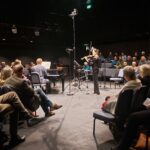Ensemble 360 wowed the audience tonight with a magical mix of diverse works for oboe and strings, played, as ever, with thrilling brilliance and intensity. Joining regulars, oboist Adrian Wilson, cellist Gemma Rosefield and violinist Ben Nabarro for this performance and combining their skills seamlessly, were Lucy Gould on second violin and Abigail Fenna on viola.
Full of exhilaration, the opening piece, Phantasy Quartet Op 2, is an early work by Benjamin Britten (1913-1976) written in 1932 and dedicated to Leon Goossens, an oboist celebrated far and wide for his purity and beauty of tone and novel use of vibrato. In fact, three of tonight’s six pieces were inspired by the exceptional talent of Goosens, a man so dedicated that, after loosing his teeth in a car accident, he completely re-learnt the oboe to suit his new embouchure and then played into his nineties, performing, some said, better than ever! This tale, along with other entertaining anecdotes, good-humoured snippets and fancy facts (like Shostakovich was a football referee and Martinu wrote a piece called Half Time) came courtesy of tonight’s sparkling virtuoso oboist Adrian Wilson, whose playing likewise never fails to move.
His haunting oboe sang, soared and soothed in the arching flow of Britten’s mesmerising Phantasy as fabulous violin, viola and cello parts built from mysterious mood (which returns at the end) to march through rhythmic, lively pluckings, buzzings and insistent, clipped tick-tockings that, even at this early stage, demonstrate Britten’s particular love of the dotted rhythm. This vibrant, exciting, dramatic piece with its grand mix of mood, techniques and tempi brought loveliness in all parts and was followed next by graceful music from a favourite Wolverhampton Wanderers’ supporter (and writer of early football anthem, He Banged The Leather For Goal) Edward Elgar (1857-1934) with his 1878 Andante and Allegro for Oboe and Strings, the oboe part written for his own brother. Again, the supreme melodic beauty and dynamic emotion of Wilson’s oboe sang through the air to the strings’ earnest rhythms.

To round off part one and give a well-earned break to the oboist it was Mozart’s String Quartet in D K.499 of 1786. With wonderful interplays of the different tones and textures of the strings, the work has plenty of typical Mozartian ear-charming intricacies, both playful and sorrowful, yet, interestingly, is much less blatantly clipped and predictable than often, especially as we head (several times) towards the final flourish.
After the break it was back to the future with Gerald Finzi (1901-1956) and Interlude for Oboe and String Quartet in A minor Op 21, again dedicated to Goossens. The melodic flow and passion of the 1936 piece create throughout a sad beauty, a delicate, haunting uneasiness of lament and loss. And then: Poem For String Quartet by viola player/composer Rebecca Clarke (1886-1979), written in 1926 and full of earnest yearnings and sighings. Alas, the prolific Clarke stopped composing once married as she was no longer able to devote all her focus to music.
Last up was the 1922 Oboe Quintet by Arnold Bax (1883-1953), later dedicated to… who else?…the great Goossens. Bax was adamant that there were certain things in life one should never try – like incest and folk-dancing. Into the bargain, he vehemently decried incorporating folk into classical music as composers like Vaughan Williams did. He wasn’t overly keen on quintets, either. But once he’d spent time in Ireland, steeped in folklore and tradition, he started to write “Irishly” and infused his intriguing oboe quintet with a good deal of Irish jiggery and airy, wistful, Celtic magic, divinely conjuring up, too, at times, hints of mystical snake-charmers. Rich, quick-changing moods, rhythms, tempi and techniques bring challenges galore to each player’s expertise not for the first time tonight. But Ensemble 360’s collective passion and virtuosity have it all covered, their lively enthusiasm and panache ensuring compelling listening all the way. Had Delboy been a chamber music fan, he’d surely have been rubbing his hands in glee, chuckling, “Lovely Jubbly!”
Eileen Caiger Gray




